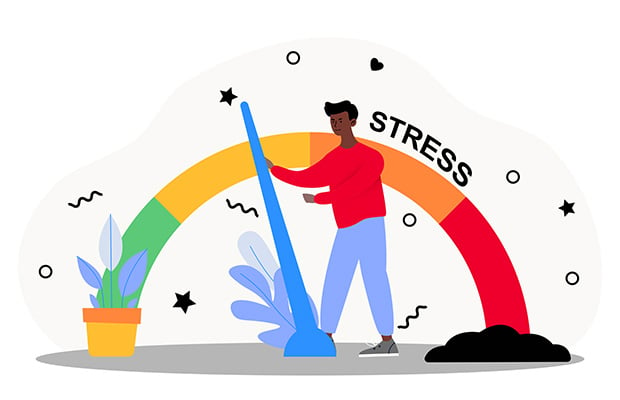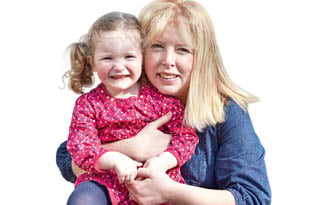For many people, having a health problem makes them feel more anxious. Sometimes that leads to panic attacks: a sudden feeling of anxiety and a fear that something terrible is about to happen.
Panic attacks can feel a lot like heart attacks, which can add to the anxiety, especially if you already have a heart problem. They can share the same physical symptoms, including shortness of breath, feeling sick, light-headed or weak, chest pain or a sensation of your heart racing. Other signs of a panic attack include trembling, feeling hot or cold, blurred vision, tingling fingers or ringing in your ears.
Panic attack or heart attack?: Nigel's story
That’s what happened to Nigel Charlesworth, a painter and decorator from Sheffield. His panic attacks started when he felt sensations that reminded him of his heart attack. “The panic came on for no reason. Suddenly my imagination was running riot thinking it was a heart attack.”
Nigel’s heart attack had happened at home in 2015. His wife Laura called 999 and Nigel went on to have four cardiac arrests in hospital. He was in hospital for 11 days, but found returning home was the hardest part. “In hospital I was getting better; and if anything went wrong there was a nursing team to step in,” he says. “At home there was nothing, and that played on my mind horrendously.”
Because the symptoms of anxiety overlap with the symptoms of a heart attack, some people who have had a heart attack might be more prone to anxiety and panic attacks.
Liz Marks, NHS Clinical Psychologist
Liz Marks, NHS Clinical Psychologist and Lecturer in Clinical Psychology at the University of Bath, says: “Because the symptoms of anxiety overlap with the symptoms of a heart attack, some people who have had a heart attack might be more prone to anxiety and panic attacks.
“If you’ve had a heart attack and you then get symptoms of anxiety, such as a fast heartbeat, you may be more likely to interpret those symptoms as another heart attack,” she says. This will make you feel more anxious, which can result in more symptoms, resulting in a vicious cycle of anxiety and a panic attack. “It’s like having a car alarm set too sensitively, and just touching the bonnet can set it off.”
During a panic attack, try to remember to breathe calmly.
Don’t fear the feeling of a panic attack
Panic attacks do feel very real and frightening, but by reminding yourself that they won’t hurt you, you can make it stop sooner.
Dr Marks says: “Panic continues because people think the physical symptoms mean something terrible will happen: for example, that they will collapse or die. Remember, panic isn’t dangerous.
“So even though you will feel anxious and uncomfortable during a panic attack, tell yourself that nothing terrible is going to happen. See if you can simply allow the anxiety to come and go without fighting it. Then the next time you feel it coming on, you won’t feel as afraid,” she says. “If you try to get rid of the panic, you won’t get the opportunity to learn that it’s actually harmless.”
Panic attacks do feel very real and frightening, but by reminding yourself that they won’t hurt you, you can make it stop sooner.
On several occasions, Nigel went to A&E and was told he wasn’t having a heart attack and may be having panic attacks instead. During one visit, Nigel was given a relaxation CD to take home. It helped him to sleep and reduced his anxiety. He also uses relaxation apps and breathing techniques.
“The fear ruled me to start with, but I’ve got the upper hand on it now,” he says. “I have to tell myself I’m not going to die going upstairs, but it took time to believe it.”
Panic is more likely if you already feel stressed, so try to tackle the stress with regular exercise, relaxation techniques and mindfulness meditation.
Panic attacks can also be a symptom of some other anxiety disorders, such as post-traumatic stress disorder (PTSD – an anxiety disorder caused by distressing events) and panic disorder. If you have been diagnosed with one of these, or if you feel constantly anxious, cognitive behavioural therapy (CBT – a type of talking therapy) may be useful. It helps people change their perception of panic and therefore how they react when they feel symptoms of panic coming on.
Nigel, now 57, didn’t work for two years after his cardiac arrests, but now works part time. He still experiences the early signs of panic, but now knows how to handle them. “My wife has really helped me to get in control of things again,” he says, “and time is a great healer.”
Where to get help for panic attacks
Mind has information on panic attacks or you can order their ‘Anxiety and panic attacks’ booklet by calling 0844 448 4448. You can ask your GP to refer you for CBT; in England you can refer yourself for NHS treatment (search for ‘find psychological therapies’).
- Read Peter's story of being diagnosed with PTSD after a heart attack and cardiac arrest.






